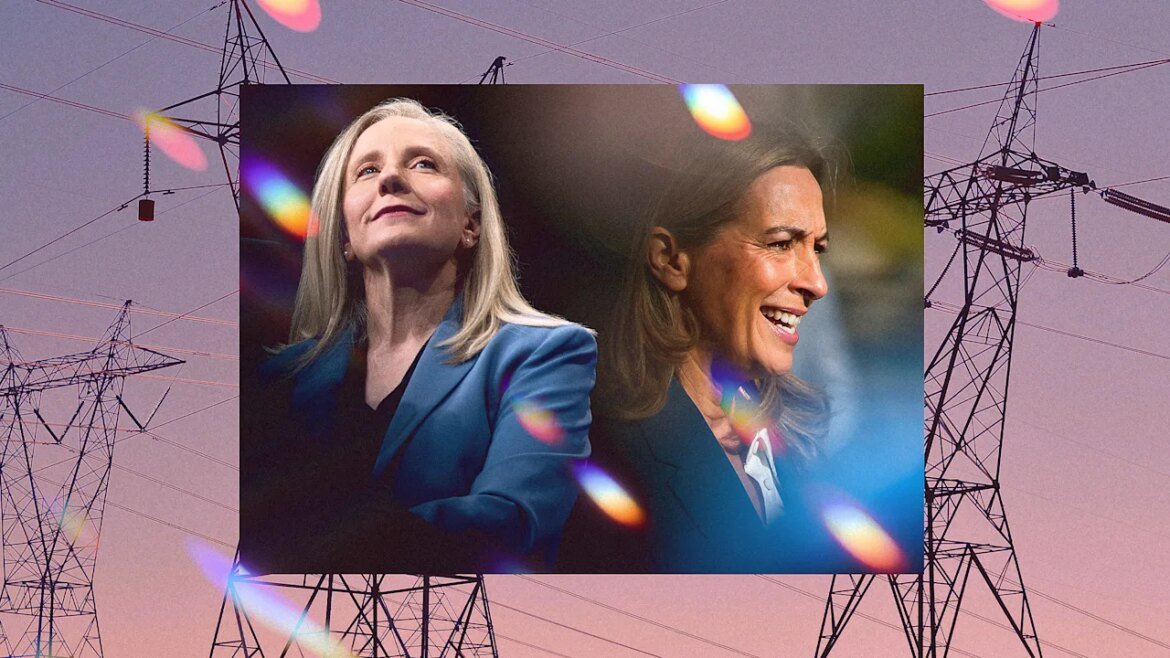Across the country, Americans have seen their electricity bills spike this year. Energy prices have been rising faster than inflation, and are expected to just keep rising.
In two states in particular, this issue became a core tenant of the Democratic candidates’ governors races.
Mikie Sherrill in New Jersey and Abigail Spanberger in Virginia both ran in part on a promise to keep electricity costs down—and both won big on election night.
“Voters in New Jersey and Virginia chose leaders ready to take on soaring energy costs and the powerful interests driving them higher,” Evergreen Action executive director Lena Moffitt said in a statement.
“Governors-elect Mikie Sherrill and Abigail Spanberger earned voters’ trust with common-sense plans to lower costs by fixing [electricity grid operator] PJM’s broken system and expanding cheap, homegrown, faster-to-build clean energy,” she added. “In elections defined by the skyrocketing cost of living, voters made clear they want leaders who will actually do something about it.”
How New Jersey’s new governor will tackle electricity prices
Rising electricity rates have hit New Jersey particularly hard. Residents there saw prices spike about 21% over this past year.
Sherrill, who won New Jersey with just over 56% of votes, pledged to declare a “state of emergency on utility costs” on her first day in office. She has also promised to freeze residents’ utility rates, build more “cheaper and cleaner power,” and push utility companies to be more transparent.
Sherrill’s state of emergency could be seen as a counter to the states of emergency that President Trump declared at the beginning of his second term.
Trump’s move to declare a national energy emergency cited a need to boost oil and gas production, even though increased drilling doesn’t necessarily translate to lower gas prices for consumers, and renewable power is the cheapest form of new energy to build.
Trump also promised to slash electricity bills for Americans during his run for the presidency, but so far into his term, energy price are up, and expected to keep climbing. Experts have blamed his actions like inhibiting renewables, canceling federal energy assistance, and enacting tariffs on energy imports.
For New Jersey, the governor declaring a state of emergency is a signal of her priorities.
“It’s put everyone on notice that I am no longer going to allow the can to be kicked down the road,” she said on WNYC Thursday morning. “It gives everyone a sense of urgency that this has got to be tackled, and it’s got to be tackled now.”
That pledge has already resulted in utility companies saying they’ll come to the table to negotiate, and spurred discussions among workers about programs that could help the electricity grid, she added. Sherrill also campaigned on developing plans for new nuclear capacity in New Jersey.
How Virginia’s new governor will tackle electricity prices
Virginia is home to the biggest data center market in the world, with more than 600 clustered around Washington, D.C., and Richmond. And though the state’s electricity prices haven’t risen as steeply as New Jersey’s, they’ve still risen about 6.7% over the last year.
As even more data centers are proposed and built, experts say energy prices are likely to increase to meet growing energy demands. Dominion Energy, the biggest electric utility in the state, is also looking to build more natural gas units to support those data centers.
That raises environmental concerns, and also price concerns. Natural gas is getting more expensive because the U.S. is exporting more and more of it to other countries.
Spanberger, who won Virginia with just over 57% of the votes, made an “Affordable Virginia Plan” a core part of her campaign. Along with housing and healthcare, the plan specifically calls out energy bills as an area she’ll focus on.
To do so, she says she’ll expand and support Virginia’s local electricity generation—including its “nation-leading offshore wind development.”
She plans to incentivize more solar energy projects on rooftops, parking lots, former industrial sites, abandoned mines, schools, and public buildings, supported by battery storage. She’ll also encourage the development of nuclear, geothermal, fusion, and hydrogen.
Spanberger has called out data centers specifically as well, saying she’ll make sure they pay “their own way and their fair share” of their new electricity and transmission needs.
It’s not yet clear how exactly she’ll do that, and Dominion contests the idea that data centers are being subsidized by consumers; instead, the utility has blamed inflation for rising costs.
But Dominion is also currently seeking to raise rates even more to increase its profit margins. Depending on how that case pans out, Spanberger said during a debate that “it may require action within the General Assembly to ensure that large utility users like data centers are paying their fair share for the energy that they consume.”



